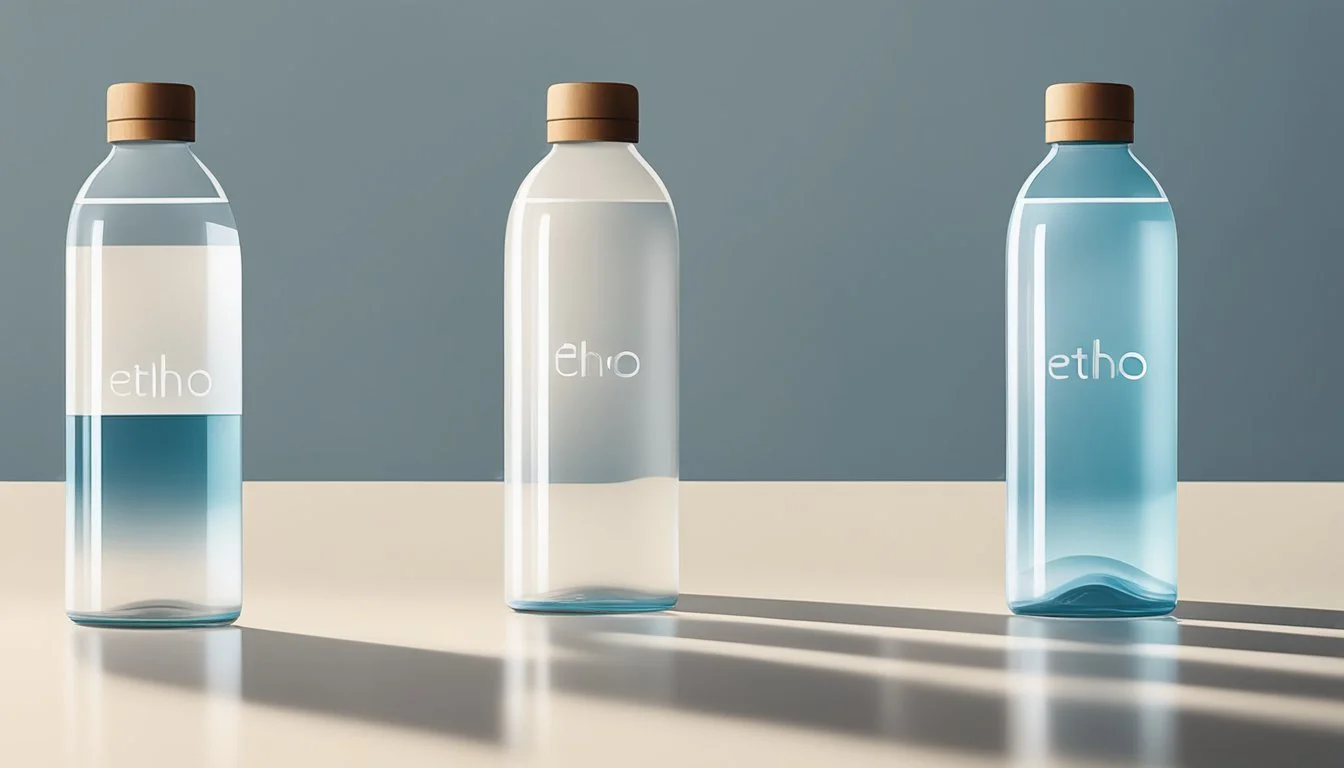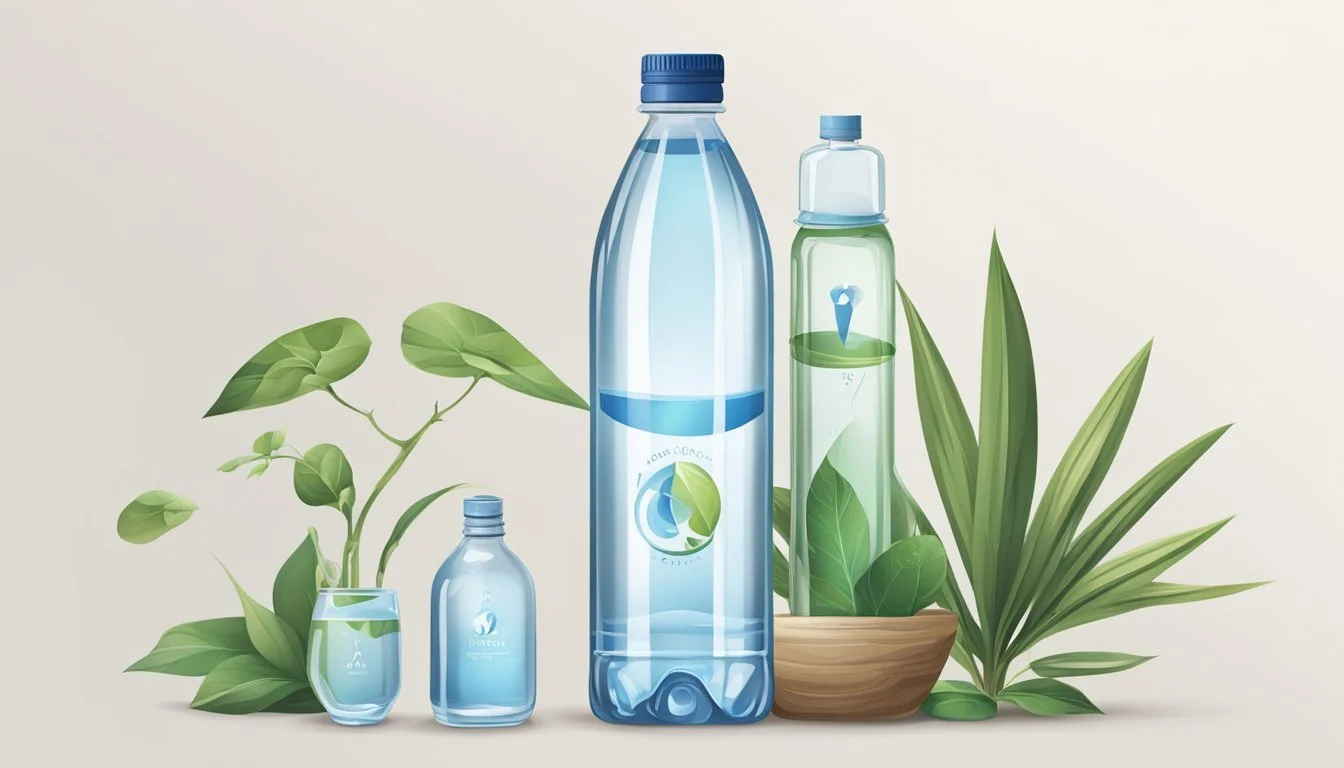Ethos vs. Path
Comparing Quality and Taste of Bottled Water
When choosing between Ethos and Path bottled water, several factors come into play, including taste, health benefits, and environmental impact. For those prioritizing environmental sustainability, Ethos may have a slight edge due to its emphasis on charitable contributions to clean water initiatives. Both brands, however, use recyclable materials, reflecting an important industry trend towards sustainability.
In terms of taste, personal preference plays a significant role. Some find Ethos to have a crisp and clean flavor, while others appreciate Path's smooth and refreshing profile. Health-wise, neither brand adds any harmful ingredients or additives, making both a safe choice for regular consumption.
By comparing these elements, consumers can make an informed decision about which bottled water suits their needs best. Whether it's ethical purchasing, taste preferences, or health considerations, both Ethos and Path offer compelling features that cater to different priorities.
Brand Origins and Philosophy
Ethos Water champions humanitarian efforts through its partnership with Starbucks, while Path Water brands itself as a leader in sustainable hydration and lifestyle.
Ethos Water: Starbucks' Humanitarian Brand
Ethos Water originates from a mission of social responsibility. Founded in 2002, it was acquired by Starbucks in 2005.
The brand's primary focus is on providing clean water to children in need. Ethos Water achieves this by donating a portion of its sales towards water programs.
Starbucks supports this mission, leveraging their extensive network to maximize impact. Through these efforts, the brand not only promotes hydration but also raises awareness about global water scarcity. Ethos Water’s initiatives aim to make a significant difference in communities lacking safe drinking water.
Path Water: Revolutionizing Hydration
Path Water differentiates itself through a strong commitment to sustainability. Launched with the goal of reducing plastic waste, Path Water offers reusable and recyclable aluminum bottles.
This approach aligns with a growing consumer demand for environmentally friendly products. Path Water promotes a lifestyle centered on sustainability and conscious hydration.
The brand also emphasizes the importance of reusability, seeing itself as an innovator in the bottled water industry. Their efforts include educational campaigns about the benefits of reducing single-use plastics. This philosophy positions Path Water as a key player in revolutionizing how people think about hydration and the environment.
Quality and Purity of Water
The key aspects of evaluating Ethos and Path bottled water include the source and natural filtration of the water, followed by the treatment and purification process each brand uses. By examining these areas, consumers can better understand the quality and purity of the water they are drinking.
Water Source and Natural Filtration
Ethos Water sources its water from carefully selected springs. These springs ensure the water has a naturally balanced mineral content, contributing to its clean taste and high purity. The natural filtration through rock layers helps in maintaining a consistent pH level, typically in the neutral to slightly alkaline range.
Path Water, on the other hand, often sources its water from municipal supplies. They emphasize using sustainable sources and focus on the origin of the water. Path Water undergoes thorough natural filtration processes, ensuring that it retains essential minerals while removing impurities effectively, resulting in purified water that meets high safety standards.
Treatment and Purification Process
Ethos Water relies on a stringent purification process that includes reverse osmosis and multiple stages of filtration. This ensures the removal of any potential contaminants while preserving beneficial minerals. The treated water is free from harmful substances like BPA, commonly found in certain plastic bottles, adding to its reputation for health and safety.
Path Water also adopts advanced purification techniques including reverse osmosis, which is highly effective in removing dissolved solids, contaminants, and other impurities. Additionally, Path Water’s packaging in reusable aluminum bottles minimizes the environmental impact, aligning with eco-friendly practices while maintaining the purity and quality of the water.
By examining these key processes, consumers can appreciate the distinct approaches Ethos and Path take to ensure their bottled water is of high quality and safe for consumption.
Health Benefits and Mineral Composition
Understanding the health benefits and mineral composition of Ethos and Path bottled waters is essential for making an informed choice. This section explores the pH levels, mineral content, and how each influences hydration and overall well-being.
Alkaline Versus Pure Spring Water
Alkaline water, known for its higher pH level, is one key feature of Path bottled water. Advocates believe that its elevated pH helps neutralize acid in the body, potentially improving muscle function and hydration. Path’s commitment to electrolytes like potassium can support muscular and neural functions.
In contrast, Ethos represents pure spring water, emphasizing natural mineral composition. Spring water retains a balanced pH, offering a naturally smooth taste without the need for additional processes. Pure spring water tends to be preferred for those seeking hydration without altering body pH.
Minerals and Hydration
Path bottled water often enriches its product with electrolytes such as magnesium, calcium, and potassium. These minerals aid in various bodily functions, including bone health and maintaining heart rhythm. Athletes and active individuals might find Path beneficial due to these added electrolytes.
Ethos, being a spring water, naturally contains a variety of essential minerals like calcium and magnesium. These contribute to a smoother taste and provide health benefits linked to bone density and metabolic efficiency. The natural mineral balance of Ethos supports consistent hydration, making it a solid choice for everyday consumption.
In summary, both Path’s alkaline water and Ethos’s pure spring water offer distinct benefits related to their mineral compositions and hydration capabilities.
Taste and Consumer Preference
Ethos and Path bottled waters cater to distinct taste profiles and preferences. Factors like pH levels and mineral balance play a significant role in defining their unique characteristics.
Understanding the Taste Profile
Ethos Water:
Ethos is purified water, which often leads to a clean and neutral taste. This can appeal to consumers who prioritize purity. Some might perceive its taste as less distinctive due to the lack of natural minerals.
Path Water:
Path water, known for its refillable aluminum bottles, may have a slight metallic taste initially due to the container. Over time, this diminishes, leaving a fresh and clean water experience. The taste can vary slightly based on local water sources and treatments used.
Consumer Preferences:
Many consumers prefer the crisp, straightforward flavor of Ethos. Others might lean towards Path for environmental reasons and accept the minor taste trade-off. Both brands maintain a loyal following based on their unique appeal.
Importance of pH Levels and Mineral Balance
Ethos Water pH Levels:
Ethos water typically has a neutral pH around 7. This neutrality can support better hydration and is gentle on the digestive system. The absence of significant mineral content means the taste is consistently mild.
Path Water pH Levels:
Path water often exhibits variations in pH based on source and treatment, usually ranging from 7 to 8. Alkaline water advocates argue that higher pH levels contribute to improved hydration and health benefits. Minerals present in Path water can enhance taste complexity.
Consumer Considerations:
Those who prefer a neutral pH often choose Ethos for its simplicity and predictability in taste. Consumers seeking potential health benefits and a richer taste profile may gravitate toward Path, appreciating its mineral content and environmental packaging.
Together, pH levels and mineral balance shape consumer experiences and preferences between these two bottled water brands.
Packaging and Environmental Sustainability
Both Ethos and Path place significant emphasis on their packaging and environmental sustainability efforts. This aspect is crucial as it influences not just the product's appeal but also its environmental impact.
Impact of Plastic Bottles on the Environment
Traditional plastic bottles significantly contribute to environmental pollution. The production process of plastic bottles releases considerable amounts of CO2 into the atmosphere. For instance, producing 50 oz of bottled water can result in up to 22 oz of CO2 emissions. This carbon footprint is exceedingly high, especially when compared to tap water, which has negligible associated CO2 emissions.
Plastic bottles also pose issues in waste management and ocean pollution. Many plastic bottles are not recycled, ending up in landfills or oceans, where they can take hundreds of years to break down. This long degradation period allows them to harm marine life and ecosystems. Reusable alternatives or improved recycling systems are critical to mitigating these adverse effects.
Eco-Friendly Alternatives
Ethos Water and Path are exploring more sustainable packaging options to reduce their environmental impact. Ethos, while using recyclable plastic bottles, integrates charitable contributions into their model, promoting clean water initiatives globally. Path, on the other hand, adopts reusable aluminum bottles, which can be refilled multiple times, reducing the need for single-use plastics.
Boxed Water brands are gaining traction with their cartons made from renewable resources. These cartons typically contain a mix of sustainable paper, aluminum, and a small percentage of plastic to ensure durability. For example, Boxed Water cartons comprise 74% paper, significantly reducing plastic usage.
Choosing eco-friendly packaging, like glass bottles or cartons, can dramatically lessen the environmental burden. These materials often have a smaller carbon footprint and are easier to recycle, leading to a more sustainable future.
Market Presence and Availability
Ethos and Path bottled water brands are widely available, both in retail stores and online. Their market penetration depends on their distribution channels and global presence.
Retail and Grocery Store Distribution
Ethos Water, owned by Starbucks, enjoys a significant retail presence. Ethos is prominently featured in Starbucks stores, which increases its visibility and availability.
In addition, Ethos can be found in major grocery chains and convenience stores.
Path water is available in retail environments as well, but its distribution is less tied to a single prominent retailer. Instead, Path focuses on eco-friendly packaging, which appeals to retailers prioritizing sustainable products.
Nestlé Waters, a major player in the bottled water industry, ensures extensive distribution for its portfolio, although it competes with Ethos and Path in retail environments.
Online and Global Reach
Online availability for Ethos and Path expands their market reach. Ethos can be purchased through Starbucks' online store, as well as major e-commerce platforms like Amazon. This ensures it reaches consumers who prefer online shopping or do not have access to physical retail locations.
Path water also leverages online marketplaces to extend its brand reach. The focus on sustainability makes Path appealing in international markets, meeting the growing demand for eco-friendly products.
Though Nestlé Waters offers extensive online purchasing options, the competition in the digital space mirrors that in retail, with Ethos and Path both striving to capture consumer interest globally.
Cost Analysis
When comparing Ethos and Path bottled water, it is important to consider their affordability and price points relative to other popular brands. Understanding where each brand stands can help consumers make informed decisions.
Affordability Versus Premium Brands
Ethos and Path generally fall into different categories in terms of cost. Ethos is typically priced in the mid-range, making it affordable compared to premium brands such as Voss, Fiji, and Evian.
Path, on the other hand, positions itself as a more sustainable option, which is reflected in its pricing. Consumers might find it more budget-friendly than high-end brands but still pricier than economy options like Pure Life.
In examining affordability, the table below highlights typical price ranges per bottle for reference:
Brand Price Range Ethos $1.50 - $2.00 Path $1.75 - $2.25 Voss $2.50 - $3.00 Fiji $2.00 - $2.75 Evian $2.00 - $2.50 Pure Life $0.50 - $1.00
Analysis of Price Points
Ethos and Path's pricing strategy is crucial when evaluating their market positioning. Ethos aims for a balance of quality and philanthropy, leading to slightly higher costs due to its partnership with clean water initiatives.
Path, meanwhile, emphasizes sustainability through reusable aluminum bottles, which factors into its cost structure.
Compared to luxury brands like Icelandic Glacial and Acqua Panna, Path's price might seem more attractive due to its environmental focus, though it still remains competitive within the premium segment.
For consumers prioritizing both quality and ethical considerations, the price range of Ethos and Path offers a middle ground between high-end luxury waters and affordability.
Considering budget constraints and personal preferences can guide the decision towards the brand that aligns best with consumer values and economic capacity.
Corporate Social Responsibility
Ethos Water and Path seek to incorporate social responsibility into their brands, each focusing on different facets of impact. Ethos Water emphasizes its humanitarian efforts, while Path concentrates on environmental sustainability.
Ethos and Humanitarian Efforts
Ethos Water is well-known for its commitment to improving access to clean drinking water in underprivileged areas. Part of the brand's profits is allocated to funding water programs and hygiene education in water-stressed countries.
These initiatives help reduce the risk of waterborne diseases and improve the overall quality of life in affected communities.
Ethos Water specifically aims to create a positive social impact by ensuring communities have access to safe drinking water. Their continued efforts have served millions globally, working through partnerships and grants to support sustainable and long-term water solutions.
Environmental Initiatives by Path
Path Water prioritizes environmental sustainability. Their main strategy involves emphasizing reusable aluminum bottles, designed to reduce plastic waste significantly.
They aim to lessen environmental footprints by encouraging consumers to refill and reuse their bottles instead of disposing of single-use plastics.
Path also engages in various environmental initiatives, focusing on reducing their carbon footprint and promoting recycling. The brand supports campaigns and policies aimed at reducing pollution and protecting natural resources, thus appealing to environmentally conscious consumers.
By addressing both water quality and environmental conservation, Path Water provides a dual approach to corporate social responsibility that resonates with many.
Consumer Insight and Brand Perceptions
Understanding consumer experiences and the impact of celebrity endorsements are crucial when comparing Ethos and Path bottled waters. These aspects provide a clearer picture of how each brand is perceived in the market.
Customer Testimonials and Reviews
Ethos Water garners positive feedback for its mission-driven approach. Many customers appreciate that proceeds contribute to clean water initiatives globally. The quality of Ethos Water is often praised, with a preference for its natural spring source. Yet, some users mention variability in taste, attributed to its natural source variations.
Path Water is recognized for its commitment to sustainability, with customers lauding its use of reusable aluminum bottles. The water's flavor is described as crisp and clean, meeting high-quality standards. Its packaging not only appeals to eco-conscious consumers but also resonates with those looking to reduce single-use plastics in their lifestyle.
Endorsements and Celebrity Influence
Ethos has benefited from endorsements by Starbucks, leveraging the coffee giant's extensive reach and customer loyalty. This partnership boosts Ethos’s visibility and aligns it with a brand known for ethical practices. Ethos also attracts attention through notable celebrity endorsements, which amplify its philanthropic message and create a favorable brand image.
Path Water gains traction through endorsements by celebrities focused on sustainability. By collaborating with influencers passionate about the environment, Path effectively communicates its commitment to reducing plastic waste. These celebrity endorsements often emphasize the lifestyle benefits of choosing Path Water, appealing to a follower base that values environmental responsibility and regulatory standards in drinking water.
More About Ethos
Ethos vs Mountain Valley Spring Water: Which Bottled Water is Better?
Ethos vs Richard's Rainwater: Which Bottled Water is Better?
Ethos vs Whole Foods Italian Still Mineral water: Which Bottled Water is Better?







